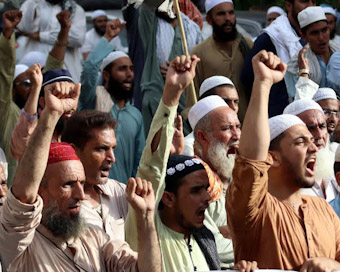 PM Modi visit USA
PM Modi visit USA Only the mirror in my washroom and phone gallery see the crazy me : Sara Khan
Only the mirror in my washroom and phone gallery see the crazy me : Sara Khan Karnataka rain fury: Photos of flooded streets, uprooted trees
Karnataka rain fury: Photos of flooded streets, uprooted trees Cannes 2022: Deepika Padukone stuns at the French Riviera in Sabyasachi outfit
Cannes 2022: Deepika Padukone stuns at the French Riviera in Sabyasachi outfit Ranbir Kapoor And Alia Bhatt's Wedding Pics - Sealed With A Kiss
Ranbir Kapoor And Alia Bhatt's Wedding Pics - Sealed With A Kiss Oscars 2022: Every Academy Award Winner
Oscars 2022: Every Academy Award Winner Shane Warne (1969-2022): Australian cricket legend's life in pictures
Shane Warne (1969-2022): Australian cricket legend's life in pictures Photos: What Russia's invasion of Ukraine looks like on the ground
Photos: What Russia's invasion of Ukraine looks like on the ground Lata Mangeshkar (1929-2022): A pictorial tribute to the 'Nightingale of India'
Lata Mangeshkar (1929-2022): A pictorial tribute to the 'Nightingale of India' PM Modi unveils 216-feet tall Statue of Equality in Hyderabad (PHOTOS)
PM Modi unveils 216-feet tall Statue of Equality in Hyderabad (PHOTOS)The 15th Hockey India Senior Men National Championship, set to take place from April 4 to
- Mensik denies Djokovic 100th title in Miami final
- KIPG: Son of a vegetable vendor, Bihar’s Jhandu Kumar eyes Worlds, 2028 Paralympics
- Hardik Singh credits hard work and team unity for receiving HI Midfielder of the Year award
- Djokovic, Alcaraz land in same half of Miami draw
- India to host 2nd Asian Yogasana Championships from March 29 to 31
Disadvantages of Religious Bigotry: Quotations and Diagnosis Last Updated : 16 Jul 2022 06:34:10 PM IST 
Disadvantages of Religious Bigotry: Quotations and Diagnosis
By: Dr Shujaat Ali Quadri
In the strict sense of political science, only six countries are based on religion. Five of them are Islamic. The Vatican is a Christian country, but everyone knows that the entire existence of a country with a population of less than a thousand depends on Italy. Out of these five Islamic countries like Afghanistan, Iran, Saudi Arabia, Mauritania and Yemen, a relative peace prevails only in Saudi Arabia because of its better economic condition. Saudi Arabia ranks better in the global indices of human living condition and quality of life due to its natural resources and economic dependence on the pilgrimage to Mecca and Medina, i.e. Hajj, the centers of the Islamic faith. We mean that not only the religion based state but the politics of religion has stopped the development and prosperity of those countries which may be democracies, but their conduct is fanatic.
According to the report of ‘Ligatum Prosperity Index 2021’ on the basis of human living standards, prosperity, development and citizen-state relations in the world, Afghanistan is ranked 163 out of 167 countries. Similarly, Yemen is ranked 165, Mauritania 153, Iran 123. As we said, Saudi Arabia is ranked 75 because its economic condition is better. This report gives India 101 ranking, Pakistan 138, Bangladesh 126.
Similarly, the Risk Report 2022 of the World Economic Forum i.e. WEF has considered the ending social relationship as the fourth biggest threat among the 10 major threats facing the world. The organisation, which has always been viewed on the basis of business and profit, also believes that the decline in social relations is the fourth biggest threat to the stability of the world.
The Observer Research Foundation published a detailed report by Maya Mirchandani in 2017. It refers to a young man from Kerala, Ashfaq Majeed, who migrated to Afghanistan in 2016. He also asked his family members to come to the ‘House of Islam’. His family did, however, tell the National Investigation Agency about his whereabouts. The young man’s house and acquaintances were astonished that when he became so fanatical, they remained clueless. It is part of a process of cyber radicalisation that fuels religious fanaticism, isolation and vengeance from within. Similar bigotry must have found its way into the youth of Udaipur who killed Kanhaiyalal, a tailor, last month. The availability of unnecessary, unintelligent and unedited material on the Internet has become so enormous that it is becoming almost impossible to sort it out. This is not happening through the dark web but through content available on open platforms, which are easily available on websites, YouTube and Telegram channels.
Similar unedited, directionless and misleading content of Hindutva also exists. In many such incidents, one gruesome one was the incident of lynching of Muslims being live-streamed as in the case of Shambhulal Raigar killing a Muslim labourer with an axe in same Udaipur. Ironically, such heart-wrenching incidents somehow can be controlled. But misleading messages and calls for revenge in the wake of such killings come unaccounted for through the Internet. It is very difficult to control such videos.
One more factor that makes it difficult to monitor and check such malignant content is the selective approach of the government regarding such content.
In its report for 2022, The Institute of Economy and Peace, an organisation researching the economic situation with peace, 163 countries have been included, in which India’s ranking is 135. According to the report, this state of peace in the country is at a low level. Pakistan’s ranking is 147, while Israel has been ranked at 134. Needless to say that religious bigotry has marred peace and prosperity of these countries.
On page number 5 of this report, it has been said that the countries, which have seen the fastest decline in peace, are India, Colombia, Bangladesh and Brazil. In the context of India, the body that released the report on the relationship of peace and development writes on page 23 that the continuous communal violence between Hindus and Muslims is the reason for such decline in the country. As we mentioned in this report, India’s global ranking is 135, which is undoubtedly above Pakistan and Afghanistan. But it is worth noting that the ranking of a small country like Bhutan is 19, Nepal 73, Sri Lanka 90 and Bangladesh 96. This report was published before the economic crisis of Sri Lanka. In the context of religion-based violence, this report makes reference to India at many places. Taking the rate of violence, the damage has been estimated in India to be more than 10 million dollars.
We have seen four types of examples here. The reality of a religion-based state based on political power, the World Prosperity Index, the World Economic Forum’s Risk Report, and a detailed report on the relationship between peace and development. All these reports and global rankings indicate that crumbling social relations and religious bigotry have given rise to an increasing number of challenges in the world. There are many countries that feign to be non-religious in their political character, however various reports raise the curtain from their hypocrisy. According to such reports, countries like Saudi Arabia and Yemen are not alone that are reaping results of religious fanaticism, there are others in this category like Syria, Pakistan, Bangladesh, Maldives, Uzbekistan, Tajikistan and Israel.
India and China, two giants of Asia, are also staring at rising mountains of bigotry, social intolerance and disorder. Unless they will control such negative impulses, their march into the future will be impeded drastically.
It is widely recognised that man needs religion for the service of humanity. But it is a pity that today religion is becoming a cause of crime against human beings. Racial discrimination and untouchability have only added more serious dimension to problems. It will be unfortunate if we go from being a country that teaches peace to the world to become a violent country. To save India, we will have to save its society from getting degenerated. And this task belongs to us all.
_(The author is the chairman of Muslim Students Organisation of India)_
For Latest Updates Please-
Join us on
Follow us on








172.31.16.186







